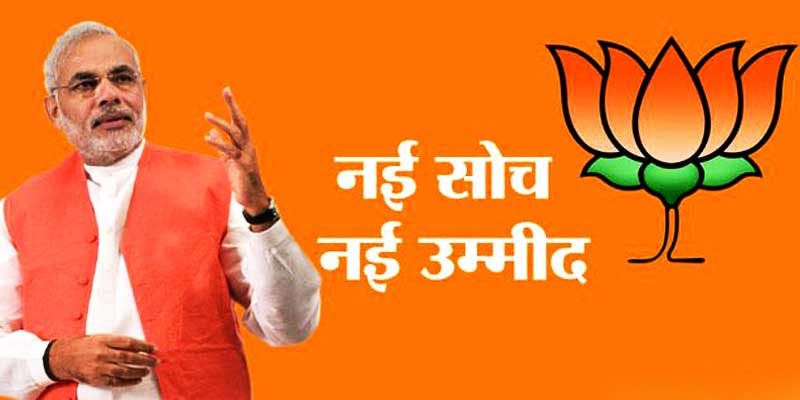A man, who rose from the lowest rungs of the society, became chief minister of Gujarat in adverse circumstances and is ready to lead the nation now.
The counting of votes has started and the Bhartiya Janata Party is already leading in more than 50 per cent of the seats. The initial trends indicate that good news is in store for the party by the end of the day. This will put an end to the debate whether there was a ‘Modi-wave’ in the country or not.
The man of the hour, obviously, is Narendra Modi. A man, who rose from the lowest rungs of the society, became chief minister of Gujarat in adverse circumstances and is ready to lead the nation now.
The opponents of Modi, in cahoots with the partisan media, have virtually demonized him in front of the people over a decade. But the extraordinary rise of the 63-year-old leader is an interesting story which India must know.
Modi’s personal life took a turn when he was 13 and was engaged to Jashodaben. By the time the children were 18, they were married but their marriage never consummated. Modi left home to live an itinerant life but before that he inspired his wife to read and learn.
For two years, he travelled the country and then returned to Gujarat. He sold tea at the Gujarat State Transport Corporation for sustenance. His political career started as a pracharak of Rashtriya Swayamsewak Sangh in 1970. However, he had been associated with RSS by the age of eight years as a volunteer.
After Modi had received some RSS training in Nagpur, which was a prerequisite for taking up an official position in the Sangh Parivar, he was given charge of Sangh’s student wing, Akhil Bharatiya Vidyarthi Parishad, in Gujarat. He went underground during Emergency and organised agitations and covert distribution of Sangh’s pamphlets at that time.
Meanwhile he completed his education too. Modi graduated with an extramural degree through Distance Education in political science from Delhi University. Modi remained a pracharak in the RSS while he completed his Master’s degree in political science from Gujarat University.
But the real test began when he was assigned to the BJP by the RSS. At that time, he worked for senior leader Murli Manohar Joshi and successfully organized his Kanyakumari-Srinagar Ekta Yatra (Journey for Unity) in 1991. He rose to prominence from there.
In 1988, Modi was elected as organizing secretary of BJP’s Gujarat unit, marking his formal entry into mainstream politics. As secretary, his electoral strategy was central to BJP’s victory in the 1995 state elections.
In November 1995, Modi was elected National Secretary of BJP and was transferred to New Delhi where he was assigned responsibility for the party’s activities in Haryana and Himachal Pradesh. Shankar Singh Vaghela defected from the BJP after he lost the 1996 Lok Sabha elections, having previously threatened to do so in 1995.
Modi was promoted to the post of General Secretary(Organisation) of the BJP in May 1998. While on the selection committee for the 1998 assembly elections in Gujarat, Modi favoured supporters of Patel over those loyal to Vaghela, in an attempt to put an end to the factional divisions within the party. His strategies were credited as being key to winning the 1998 elections.
In 2001, Keshubhai Patel’s health was failing, and the BJP had lost seats in the by-elections. Allegations of abuse of power, corruption and poor administration were being made, and Patel’s standing had been damaged by his administration’s handling of the Bhuj Earthquake of 2001.
On the other hand, Modi along with RSS workers did the rehabilitation work in the affected areas and won the hearts of people. He rose to be a mass figure at that time.
As a result, the BJP’s national leadership sought chose Modi as replacement of Patel. However, veteran LK Advani did not want to ostracise Patel and was worried about Modi’s lack of experience in governance. But Modi showed confidence and declined an offer to be Patel’s deputy chief minister, informing Advani and then PM Atal Bihari Vajpayee that he was “going to be fully responsible for Gujarat or not at all”.
On 7 October 2001, Modi was appointed the Chief Minister of Gujarat, with the responsibility of preparing the BJP for elections in December 2002. Immediately after being sworn in, he announced relief for the people broken by the earthquake and wiped there tears too. He turned the misfortune into an opportunity and now Gujarat stands as the state with best nfrastructure.
The dark patch started with the unfortunate Godhra train massacre and the ensuing communal riots in Gujarat in 2002, where several innocent people lost their lives. A train carrying non-violent harmless karsewaks were set on fire and nearly 60 persons were burnt to death. In the aftermath, many innocent people from the minority were killed.
Modi was held responsible for the act and he is, till now, equated with a butcher for the act by his opponents despite the fact that he has been given a clean chit by an SIT created by the Supreme Court of India.
But one should read Manushi editor Madhu Kishwar’s book, titled Modi, Muslims and Media to get the complete picture.
As Ram Jethmalani in his Sunday Guardian article wrote: The carnage on the Sabarmati Express, which was carrying karsevaks from Ayodhya to Ahmedabad, took place on 27 February 2002 at 8.30 a.m., as it moved about 500 yards from Godhra station and was stopped at a signal, through repeated chain pulling by the conspirators. A crowd of around 2,000 Muslims started stoning the train mercilessly and setting fire to the coaches, having prepared the previous night with petroleum and acid bombs. Compartment doors were locked from outside, and the karsevaks were trapped in the fire and smoke. 59 persons, including women and children, in four coaches, were gruesomely burnt alive.
It was the Gujarat Pradesh Congress Committee, and the Congress proxy NGO Jan Sangharsh Manch which put up a false defence in the case along with criminals when it came to power in centre. It was said that it was an accidental fire, caused by a stove or an electrical short circuit. An intelligent fire, certainly, singling out only the karsevaks and their families.
Modi has always been presented by the media and his opponents as a divisive force. But Kishwar extensively quotes Zafar Sareshwala, a respected Gujarati Muslim entrepreneur, who started by wanting to take Modi to the International Court of Justice, and ended up by becoming his friend, after he met him in London in August 2003, and was astonished by his sincerity, his openness, and his good intentions for the Muslim community.
Despite this, Modi consecutively won three assembly elections in Gujarat.
When Modi wanted to lead as a PM, he faced several opposing hands within his party for the sheer concern of his name being associated with Hindu fundamentalism and being projected as a divisive figure. But e seems to be proving everyone wrong.
In a corruption ridden country where the chief source of corruption is the Congress and its leaders, Narendra Modi shines for his impeccable integrity. He has focused his entire energy on building in Gujarat an able administration and good governance. He has achieved phenomenal development and economic growth, and at the same time bolstered social inclusiveness. Repeatedly in his election rallies too, Modi talked about development, employment, and better economy in the country which he would like to bring.
As the results of the elections are coming and based on the coming leads, Modi is all set to become the Prime Minister. The Lotus is blooming.





